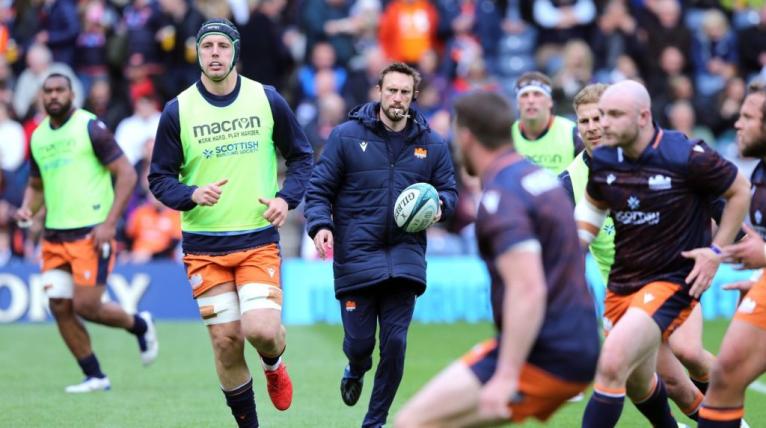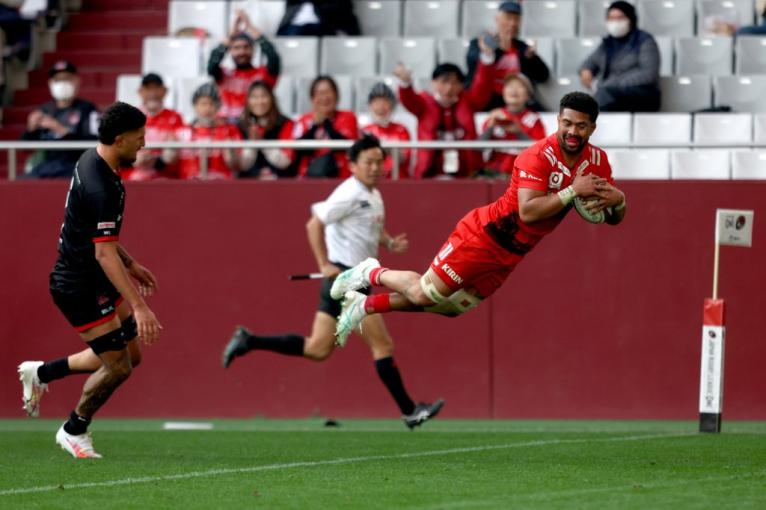Mike Blair is lounging on a balcony above a Bangkok golf resort. The evening sun paints pastel colours in the sky, intensifying the vivid green of the fairways and palm fronds, and the deep blue of the water hazard cutting through the course. The cityscape stands proud in the background and beyond that, the Gulf of Thailand shimmers on the horizon. Blair takes in this vista and, presumably, wonders where it all went wrong.
This time last year, he was swaddled in layers to fight the Scottish winter and immersed in the constant plate-spinning act which befalls a head coach in his homeland. He was midway through his second season as Edinburgh supremo and beginning to feel overwhelmed. There were contracts to negotiate, recruitment to be tied up, and myriad admin to handle off the field. On it, seismic inter-city derbies with Glasgow Warriors sat either side of Christmas.
Blair stood down from his first head coach role in April, a decision which shook the Scottish rugby ecosystem. He had yanked Edinburgh away from the malaise and the monotony of Richard Cockerill’s last year in charge, took them to the URC play-offs and won the 1872 Cup with eye-catching style. Last season form stuttered, tight encounters were lost, opportunities missed, and Blair fought for breath amid the competing demands of his job.
“[Scottish Rugby CEO] Mark Dodson went out on a limb for me and I’d like to feel I repaid him for giving me that opportunity in the feelgood factor and results we had,” Blair tells RugbyPass.

“People forget, that second season we got to the knockout stages of the Champions Cup which we hadn’t done in five years. It’s easy to give the narrative that it was a disastrous season because we came 12th in the URC but there were still some positives in what we were trying to do.
“That first season, it felt so many things were on our side. We’d score a try with the last play to win the game and with a bonus point. The second season, we didn’t get the rub of the green. We should have beaten the Bulls in Pretoria. We were a couple of tries up against Munster and lost. There were crucial moments in the 1872 Cup games we lost when kicks went out on the full.”
Blair’s reflections are laced with gratitude for the faith Dodson and others had in him. He has no quarrel with his former employer, but though he does not broach it himself, there is a wider discussion to be had about how Scottish Rugby runs its two pro-teams and the pressure it places on those at the top.
Unlike in most other systems, head coaches are not supported by directors of rugby or recruitment chiefs. There are staff members who help with this stuff, but generally as an add-on to their already substantial workloads. Blair is an excellent technical coach but had little experience in the many other aspects of the job which had an asphyxiating effect on his life. The human impact cannot be underestimated and even from a purely utilitarian standpoint, while Edinburgh and Glasgow wield unprecedented financial oomph, it would be foolish not to back those in charge of using it with as much assistance as possible.
I learned a huge amount about myself, my strengths and weaknesses, things that were important to me.
Scotland can ill afford to lose talented home-grown coaches when the structure to develop them is so small, and lessons should be learned from Blair’s tenure.
“I didn’t know what support I needed,” he says, eight months on from his final match. “There was a lot going on but the early results we had, we were at the top of the league after the first seven-eight weeks and it doesn’t look like it’s a struggle from the outside.
“With Harlequins, for example, they have layers and layers of who is in charge of what, but that is not the model Scottish Rugby use. The head coach does all those roles. Who is to say which method is better?
“I definitely don’t regret doing it. I learned a huge amount about myself, my strengths and weaknesses, things that were important to me and, if I was to go back and do it again, how would I do things differently.”
It was almost exactly a year ago Blair gave a stark post-match interview which bordered on the self-flagellating, a window into a brain working overtime. Edinburgh had lost the second derby – their fifth defeat in six games – to Glasgow and their slump in form vexed him.

“I took a lot on my shoulders, especially those 1872 Cup games. I remember my interview, saying there must be something I’m not doing right because I’m not getting enough out of the players, but I reflect on it and we’d played really well for large parts of the game. But then Glasgow, who are a really good side, scored a couple of cracking tries.
“Maybe I overthought those moments and challenged myself rather than backing my instinct or knowledge and what I was trying to do. That’s definitely something I see with a lot of successful head coaches. I see that with Gregor Townsend, he is steadfast in how he wants to play the game.
“I struggled to rationalise that I or we as a coaching team were doing a good job when we weren’t winning games when potentially a more experienced coach would.
“We could definitely have done a better job in some games. Other times the toss of a coin would be the difference between winning and losing.
“I tried to find more reasons, it must be this, we need to change that, whereas maybe we didn’t need to change. Maybe it was just that we didn’t get the bounce of the ball in a couple of games against strong opposition.”
We live in a huge apartment block with a gym, tennis courts, concierge and the like.
It was Townsend who gave Blair his first taste of elite coaching, as his playing career drew to a close at Glasgow. It was the Scotland boss, too, who encouraged his old friend to test himself in the top job. Dave Rennie is Blair’s other great influence and soon after his departure from Edinburgh, the deadpan Kiwi offered him a job at Kobe Steelers.
This famous Japanese club is now home to Ardie Savea, Brodie Retallick and Ngani Laumape. Blair can work solely on creating an attack and nurturing a group of players. His wife, Viv, and two children, Rory and Lucy, have settled on the sleek Rokko Island, a man-made atoll dangling southeast of Kobe City in the Osaka Bay. The dramatic change in scenery and circumstance has given the clan an invigorating life experience. Young Rory, 14, is an aspiring rugby player and has his dad’s career path mapped out already.
“He told me the other day, ‘Dad, we’ll do Kobe, we’ll do a couple of years in France and I’ll go to a good rugby school, then my last two years at school we’ll be back in Edinburgh’. He’ll change his mind with that.
“We live in a huge apartment block with a gym, tennis courts, concierge and the like. The kids cycle to the local international school every morning. They leave their bikes on the street, no crime at all, they run around between all the different apartments.
“I looked at it in two ways: if the kids and Viv settled really well, thumbs up, but if we didn’t, you’d have to instil a bit of resilience in them. Dealing with tough situations was something I lacked a little bit in my upbringing. I was very fortunate with the life I had. I want the kids to test themselves, be in difficult situations and come out the other side of it. It’s been what I’d hoped for.”

Blair is no longer leading an entire organisation but his workload is just as vast – only it comes with a sharper focus.
“It’s a similar kind of role to the one that maybe would have worked better for me at Edinburgh,” he says.
“I’ve been able to compartmentalise it a little more. I talked about getting out the comfort zone and it doesn’t always translate well what I meant by that: coaching people I have never met before, trying to find different ways of getting them to be the best you can be, the fact you have to use translators a lot is a real test.
“I like the relationship side of things, you bump into people on the way out to training and you mention a clip and you can’t always do that here because there’s not always a translator there. Having to adapt to that has been great.”
I think Thom Evans showed Nicole Scherzinger that clip and that was what finally made her fall for him.
Unlike back home, the fixture list caters to a little festive downtime, allowing the Blairs to spend New Year in the Thai golf resort. It will be here Blair takes in the 1872 Cup decider between his former clubs on Saturday, with Glasgow 22-10 ahead and a raucous 30,000-strong crowd streaming through the Murrayfield turnstiles.
“My first derby as a player was in 2002, I scored a try against Glasgow, running past Kenny Logan in the corner and it wasn’t given. They are usually tight games, referee calls usually have a significant impact on the flow of the game, and the weather is usually s**t.
“I remember one year, I took the ball off the tail of a lineout around halfway and Thom Evans tackled me right on the line – I ran 40m and I think he did a lap around the pitch and then came back and still caught me. I think he showed Nicole Scherzinger that clip and that was what finally made her fall for him.
“It’s quite nice to watch the Edinburgh-Glasgow games, sitting here in 30C heat, not worrying about anything.”
All of which brings us to the balcony, the fairways and that breathtaking view. Edinburgh will always be home, but right now, the strains of the past feel blissfully far away.



Comments
Join free and tell us what you really think!
Sign up for free